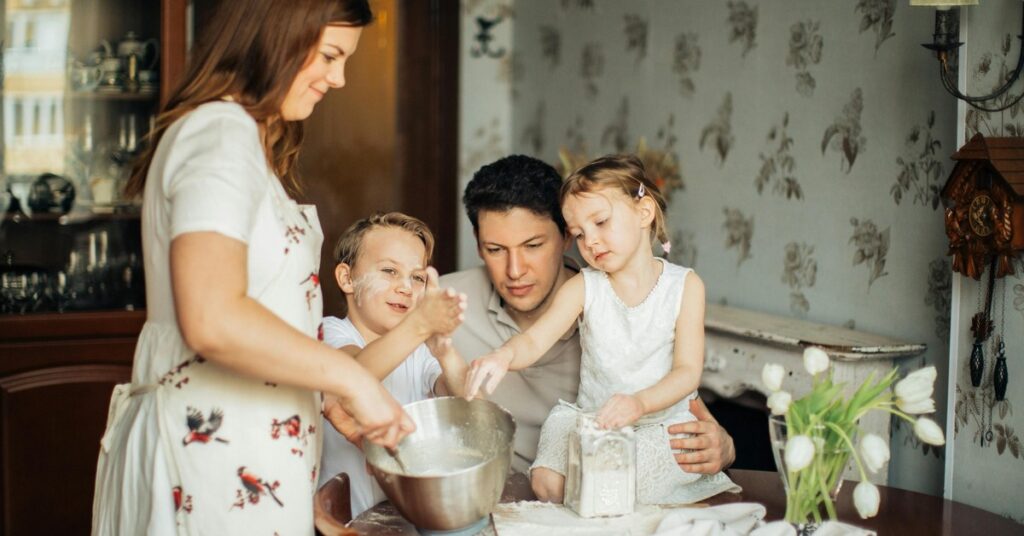Turn screen time into team time. These simple family games and short household challenges help kids (and grown‑ups) practice communication, problem‑solving, and cooperation—while laughing together at home.
Why Teach Teamwork at Home?
True family connection grows through doing things with each other, not just near each other. When family members work toward a shared goal—balancing a ball, solving a clue, building a pillow fort—they naturally practice skills that matter everywhere: clear communication, listening, turn‑taking, compromise, and encouragement. Regular teamwork play also reduces sibling conflict because kids get frequent, low‑stakes practice cooperating.
Short, playful challenges fit busy schedules: five‑minute warm‑ups before dinner, a 20‑minute game night, or a weeklong household mission that earns a fun reward. Start small; the goal is repeatable fun, not perfection.
How to Use This Guide
- Pick your length: Grab a 5‑minute mini‑game or plan a weekly challenge.
- Rotate the leader: Let different family members read instructions and guide the group.
- Celebrate effort: Cheer every try; score “team points” for cooperation, not speed.
- Adapt for ages & abilities: Make tasks easier (bigger targets) or harder (time limits) so everyone can contribute.
- Capture memories: Snap photos; kids love seeing their teamwork timeline.
Low‑Prep Teamwork Games (5‑15 Minutes)
No special kits—just items you already have. Perfect for after‑school re‑connection or a quick energy reset.
1. Blanket Flip Challenge
Goal: The whole family stands on a blanket and flips it over without anyone stepping off.
You need: 1 large blanket or sheet.
- All players stand on the blanket.
- Working together, fold/flip sections so the blanket turns over.
- Feet must stay on fabric! Restart if someone steps off.
Teamwork Skill: Planning, communication, balance.
Make it easier: Allow one toe off at a time. Harder: Add a time limit.
2. Human Knot (Lite Version)
Goal: Un‑tangle your linked arms to form a circle—no letting go.
You need: Just people! Smaller hands? Use soft scarves to link wrists gently.
- Players form a circle, reach in, and grab two different hands (not next to you).
- Without releasing, twist, duck, and step over arms until a circle forms.
Teamwork Skill: Communication, patience, gentle physical coordination.
Variation: Silent round—no talking, just gestures.
3. Silent Line‑Up
Goal: Line up in order (age, birthday month, height, shoe size) without speaking.
You need: Nothing.
- Choose the category (try birthday month first).
- Everyone must communicate silently—gestures, numbers on fingers, pointing.
- Check your order. If wrong, discuss what helped or confused the team.
Teamwork Skill: Non‑verbal communication, problem‑solving.
Harder: Time the round; try to beat your record.
4. Build‑the‑Tower Relay
Goal: Build the tallest standing tower in 5 minutes—only one builder may touch the pieces at a time.
You need: Blocks, plastic cups, or pantry boxes.
- Set a build area.
- Players take turns (every 10 seconds) adding or adjusting pieces.
- Talk strategy between turns; hands off during others’ turns.
Teamwork Skill: Turn‑taking, planning ahead.
Variation: Use recycled cardboard; measure height at the end.
Ongoing Home Challenges (1–7 Days)
Stretch teamwork muscles with mini‑missions you track across days. Small rewards (choose Saturday dessert, pick next movie) keep motivation high.
1. Family Chore Quest Board
Create a visible chart with team goals (dishes done, toys sorted, laundry folded). Earn “team stars” when everyone helps. Hit the weekly target & unlock a game night or outing.
Skill Focus: Shared responsibility, accountability.
2. Ingredient Mystery Meal
Pick 3–5 surprise ingredients from the pantry. As a team, plan a simple meal or snack using all of them. Assign roles: mixer, chopper (with adult help), plate artist, taste tester.
Skill Focus: Creativity, delegation, following directions.
3. Puzzle Marathon Wall
Tape a large poster or puzzle board to a wall/table. Work together in short bursts all week. Mark progress with sticky notes: “100 pieces done!” Celebrate completion with a family photo.
Skill Focus: Persistence, visual collaboration.
4. Kindness Chain Challenge
Cut paper strips. Each time a family member does a helpful act (share toy, help homework, say thank you) write it and staple to the chain. When the chain reaches a set length, enjoy a shared reward.
Skill Focus: Empathy, noticing others, positive reinforcement.
Helpful Digital Team Games (Optional)
Short bursts of cooperative digital play can reinforce real‑world teamwork—especially when paired with an offline debrief. Choose age‑appropriate, non‑violent titles where players must plan together. Popular family picks include building‑style sandbox worlds, cooking‑chaos teamwork games, and party collections that reward coordination over competition. Always balance screen and off‑screen play.
Keep It Positive & AdSense‑Safe
- Focus language on cooperation: Say “How can we solve it together?” instead of “Who messed up?”
- Model good sportsmanship: Adults admit mistakes and invite fixes.
- Set gentle rules: No put‑downs, no rough play; pause and reset if emotions rise.
- Little wins matter: Record “team streaks” (days played together) to motivate.
- Inclusive for all ages: Give toddlers simple jobs; teens can track points or time rounds.
FAQ: Family Teamwork Games
How often should we schedule family game time?
Consistency beats length. Even 10 minutes three times a week builds habits. Add a longer session on weekends when possible.
What if my kids get competitive fast?
Score teamwork points, not winning points. Praise helpful moves: “Great idea sharing space on the blanket!” Switch to collaborative goals if tempers flare.
How can I involve a toddler and a teen?
Use layered roles: toddler presses start, teen tracks time, adults steady the blanket. Mixed‑ability roles keep everyone in the game.
Do we need to buy special materials?
No. Most games use blankets, paper, pantry items, or toys you already own. Repurpose cardboard, cups, socks—kids love creative hacks.

